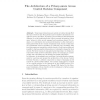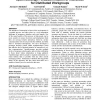182 search results - page 20 / 37 » End-User Privacy in Human-Computer Interaction |
108
Voted
CHI
2004
ACM
16 years 3 months ago
2004
ACM
Sensing affect raises critical privacy concerns, which are examined here using ethical theory, and with a study that illuminates the connection between ethical theory and privacy....
286
Voted
CASSIS
2005
Springer
15 years 8 months ago
2005
Springer
Today many interactions are carried out online through Web sites and e-services and often private and/or sensitive information is required by service providers. A growing concern r...
132
Voted
CHI
2011
ACM
14 years 6 months ago
2011
ACM
We performed a study of Facebook users to examine how they coped with limitations of the Facebook privacy settings interface. Students graduating and joining the workforce create ...
127
click to vote
CHI
2008
ACM
16 years 3 months ago
2008
ACM
The initiation of interaction in face-to-face environments is a gradual process, and takes place in a rich information landscape of awareness, attention, and social signals. One o...
127
Voted
CHI
2010
ACM
15 years 9 months ago
2010
ACM
People now routinely carry radio frequency identification (RFID) tags – in passports, driver’s licenses, credit cards, and other identifying cards – where nearby RFID reader...


